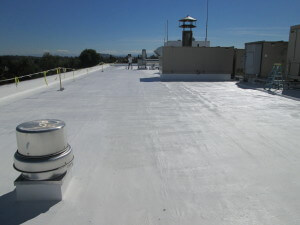Energy Tax Deduction
vs.
Maint. Tax Deduction
We have become aware of a recent increase in questions about Federal Energy Tax Deductions and Roof Maintenance Tax Deductions. There has been misunderstanding, leading some property owners to believe they are entitled to a tax credit for a new roof. This is not the case. It is important to completely understand the benefits and differences between the two tax deductions, especially when considering an expense such as a roof replacement.
With the new and changing energy laws it is becoming more and more an ancient idea to replace an existing roof. Even if you are dealing with a problem roof, there are options other than a complete tear-off. Some of these alternatives have benefits most traditional roof systems can not offer. California state laws now require that any new roof be a rated cool roof. It is even thought that these ideas may soon be adopted nation wide. Qualifying cool roofs must display specific energy saving characteristics, such as high reflectivity, high thermal emittance and low VOC content. It is these new implemented principals that are making roof replacements obsolete in the state of California. The cost just does not out-weigh the benefits.
Example:
To replace an existing roof with a new BUR and energy efficient Cap Sheet could cost double what it would to simply recondition the same existing roof with a lasting energy efficient coating. In most cases, a tear-off roof replacement only acts as a cool roof temporarily. The initial ratings qualify it as a cool roof but aged testing proves that the energy saving properties, reflectivity and heat emittance, are reduced up to 50% by the 3rd year. What a waste of money!
Unfortunately this is the sad truth for many building owners. The reason is that under a new BUR with Cap Sheet you have black, heat absorbing materials used to hold the mineral cap in place and seal countless seams. When the mineral cap begins to wear the black is exposed and the radiant heat effect takes place. Now, rather than cooling your building, your new roof begins to deteriorate and heat your building. The exact opposite of what it was intended for. This is true for systems with an acrylic top coat as well. There is no lasting value in installing either of these systems.
Now down to the $$$:
A new roof does not qualify you for a tax credit but you can write off the entire cost of a qualifying roof recondition. A recondition is considered a maintenance expense on your taxes and can be deducted all in the same year that the roof recondition is completed. This is a drastic difference from having to depreciate a portion of the cost over the course of several years as with tear-offs. For a tear-off roof replacements, the Federal tax deduction is a maximum of $.60 per sq./ft, a very small portion of what it really costs to replace your roof. By installing an energy efficient SureCoat roof, the Federal tax deduction is $2.40 – $4.00 per sq./ft. Here, you can see the difference in real dollars and cents between reconditioning your roof rather than replacing it.
Finally there is a solution to problem roofs that is beneficial all the way around. SureCoat Systems Solutions make replacing your roof a thing of the past!
Good for the Environment:
- Never needs to be torn off
- No poisonous roof materials discarded in landfills
- Super VOC compliant – Environmentally friendly
Good for Property Owner:
- “Better than new Roof” for a portion of the cost
- Lowers cooling costs
- Extends life of HVAC systems
- Seals sheet metal ducts & plenums
- Low maintenance required
- Renewable warranty for life of building
- Huge maintenance tax deduction
Good for the Contractor, Roof Consultant and Architect:
- Offer flat roof solutions to secure more contracts
- Solve problems that others can not
- Drive business back to your company
- Offer ponding water warranty for flat roofs
- Recondition any type of existing roof
- Self-flashing, Self-adhered
- No holes in roof deck
- No Seams
Disclosure: We are not tax experts and offer no financial advice. It is recommended that you consult your tax advisor about your individual tax situation.





